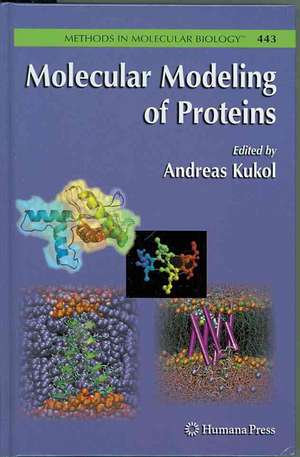Molecular Modeling of Proteins: Methods in Molecular Biology, cartea 443
Editat de Andreas Kukolen Limba Engleză Hardback – 19 feb 2008
| Toate formatele și edițiile | Preț | Express |
|---|---|---|
| Paperback (2) | 699.90 lei 38-44 zile | |
| Springer – 30 apr 2017 | 699.90 lei 38-44 zile | |
| Humana Press Inc. – 19 noi 2010 | 944.16 lei 43-57 zile | |
| Hardback (2) | 957.75 lei 43-57 zile | |
| Humana Press Inc. – 19 feb 2008 | 957.75 lei 43-57 zile | |
| Springer – 21 oct 2014 | 1129.96 lei 43-57 zile |
Din seria Methods in Molecular Biology
- 9%
 Preț: 791.63 lei
Preț: 791.63 lei - 23%
 Preț: 598.58 lei
Preț: 598.58 lei - 20%
 Preț: 882.98 lei
Preț: 882.98 lei -
 Preț: 252.05 lei
Preț: 252.05 lei - 5%
 Preț: 802.70 lei
Preț: 802.70 lei - 5%
 Preț: 729.61 lei
Preț: 729.61 lei - 5%
 Preț: 731.43 lei
Preț: 731.43 lei - 5%
 Preț: 741.30 lei
Preț: 741.30 lei - 5%
 Preț: 747.16 lei
Preț: 747.16 lei - 15%
 Preț: 663.45 lei
Preț: 663.45 lei - 18%
 Preț: 1025.34 lei
Preț: 1025.34 lei - 5%
 Preț: 734.57 lei
Preț: 734.57 lei - 18%
 Preț: 914.20 lei
Preț: 914.20 lei - 15%
 Preț: 664.61 lei
Preț: 664.61 lei - 15%
 Preț: 654.12 lei
Preț: 654.12 lei - 18%
 Preț: 1414.74 lei
Preț: 1414.74 lei - 5%
 Preț: 742.60 lei
Preț: 742.60 lei - 20%
 Preț: 821.65 lei
Preț: 821.65 lei - 18%
 Preț: 972.30 lei
Preț: 972.30 lei - 15%
 Preț: 660.49 lei
Preț: 660.49 lei - 5%
 Preț: 738.41 lei
Preț: 738.41 lei - 18%
 Preț: 984.92 lei
Preț: 984.92 lei - 5%
 Preț: 733.29 lei
Preț: 733.29 lei -
 Preț: 392.60 lei
Preț: 392.60 lei - 5%
 Preț: 746.26 lei
Preț: 746.26 lei - 18%
 Preț: 962.66 lei
Preț: 962.66 lei - 23%
 Preț: 860.22 lei
Preț: 860.22 lei - 15%
 Preț: 652.64 lei
Preț: 652.64 lei - 5%
 Preț: 1055.50 lei
Preț: 1055.50 lei - 23%
 Preț: 883.87 lei
Preț: 883.87 lei - 19%
 Preț: 491.89 lei
Preț: 491.89 lei - 5%
 Preț: 1038.86 lei
Preț: 1038.86 lei - 5%
 Preț: 524.16 lei
Preț: 524.16 lei - 18%
 Preț: 2122.34 lei
Preț: 2122.34 lei - 5%
 Preț: 1299.23 lei
Preț: 1299.23 lei - 5%
 Preț: 1339.12 lei
Preț: 1339.12 lei - 18%
 Preț: 1390.26 lei
Preț: 1390.26 lei - 18%
 Preț: 1395.63 lei
Preț: 1395.63 lei - 18%
 Preț: 1129.65 lei
Preț: 1129.65 lei - 18%
 Preț: 1408.26 lei
Preț: 1408.26 lei - 18%
 Preț: 1124.92 lei
Preț: 1124.92 lei - 18%
 Preț: 966.27 lei
Preț: 966.27 lei - 5%
 Preț: 1299.99 lei
Preț: 1299.99 lei - 5%
 Preț: 1108.51 lei
Preț: 1108.51 lei - 5%
 Preț: 983.76 lei
Preț: 983.76 lei - 5%
 Preț: 728.16 lei
Preț: 728.16 lei - 18%
 Preț: 1118.62 lei
Preț: 1118.62 lei - 18%
 Preț: 955.25 lei
Preț: 955.25 lei - 5%
 Preț: 1035.62 lei
Preț: 1035.62 lei - 18%
 Preț: 1400.35 lei
Preț: 1400.35 lei
Preț: 957.75 lei
Preț vechi: 1167.99 lei
-18% Nou
Puncte Express: 1437
Preț estimativ în valută:
183.29€ • 190.65$ • 151.32£
183.29€ • 190.65$ • 151.32£
Carte tipărită la comandă
Livrare economică 14-28 aprilie
Preluare comenzi: 021 569.72.76
Specificații
ISBN-13: 9781588298645
ISBN-10: 1588298647
Pagini: 402
Ilustrații: XII, 390 p.
Dimensiuni: 155 x 235 x 26 mm
Greutate: 0.8 kg
Ediția:2008
Editura: Humana Press Inc.
Colecția Humana
Seria Methods in Molecular Biology
Locul publicării:Totowa, NJ, United States
ISBN-10: 1588298647
Pagini: 402
Ilustrații: XII, 390 p.
Dimensiuni: 155 x 235 x 26 mm
Greutate: 0.8 kg
Ediția:2008
Editura: Humana Press Inc.
Colecția Humana
Seria Methods in Molecular Biology
Locul publicării:Totowa, NJ, United States
Public țintă
ResearchCuprins
Methodology.- Molecular Dynamics Simulations.- Monte Carlo Simulations.- Hybrid Quantum and Classical Methods for Computing Kinetic Isotope Effects of Chemical Reactions in Solutions and in Enzymes.- Comparison of Protein Force Fields for Molecular Dynamics Simulations.- Normal Modes and Essential Dynamics.- Free Energy Calculations.- Calculation of Absolute Protein–Ligand Binding Constants with the Molecular Dynamics Free Energy Perturbation Method.- Free Energy Calculations Applied to Membrane Proteins.- Molecular Modeling of Membrane Proteins.- Molecular Dynamics Simulations of Membrane Proteins.- Membrane-Associated Proteins and Peptides.- Implicit Membrane Models for Membrane Protein Simulation.- Protein Structure Determination.- Comparative Modeling of Proteins.- Transmembrane Protein Models Based on High-Throughput Molecular Dynamics Simulations with Experimental Constraints.- Nuclear Magnetic Resonance-Based Modeling and Refinement of Protein Three-Dimensional Structures and Their Complexes.- Conformational Change.- Conformational Changes in Protein Function.- Protein Folding and Unfolding by All-Atom Molecular Dynamics Simulations.- Modeling of Protein Misfolding in Disease.- Applications to Drug Design.- Identifying Putative Drug Targets and Potential Drug Leads.- Receptor Flexibility for Large-Scale In Silico Ligand Screens.- Molecular Docking.
Recenzii
From the reviews:
"This book covers many different aspects of protein modeling and is just one volume in an extremely large series … . might be useful as an overview of the various techniques and methods used for the molecular modeling of proteins." (Andrzej Kloczkowski and Robert L. Jernigan, Journal of the American Chemical Society, Vol. 130 (37), 2008)
"This book covers many different aspects of protein modeling and is just one volume in an extremely large series … . might be useful as an overview of the various techniques and methods used for the molecular modeling of proteins." (Andrzej Kloczkowski and Robert L. Jernigan, Journal of the American Chemical Society, Vol. 130 (37), 2008)
Textul de pe ultima copertă
Molecular modeling has undergone a remarkable transformation in the last 20 years, as biomolecular simulation moves from the realm of specialists to the wider academic community. Molecular Modeling of Proteins provides thorough introductions and a compilation of step-by-step methods applicable to problems faced by non-specialists – especially those new to the software packages used in molecular modeling. Tips on troubleshooting and avoiding common pitfalls are included in this book, along with chapters covering a wide range of subjects ranging from free energy calculation to applications for drug design. Written by an internationally distinguished panel of investigators and outlining the most striking developments in the field, Molecular Modeling of Proteins is an invaluable resource for those in the industry, as well as a cutting-edge reference for students and professionals in the fields of chemistry, biochemistry, biology, biophysics and bioinformatics.
Caracteristici
Provides step-by-step protocols presented by world renowned experts in the field Contains authoritative reviews of methods applicable to protein modeling Enables readers to apply state-of-the-art methods to their own research Contains links to downloadable software made available by the authors Includes supplementary material: sn.pub/extras










